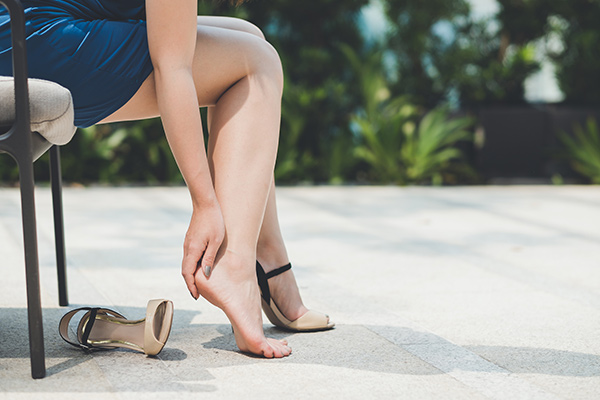
Did you know that your heel bone (calcaneus) is the largest bone in your foot? Heel pain is a common occurrence. According to the American Academy of Orthopaedic Surgeons, about 2 million people each year seek treatment for plantar fasciitis – and that’s just one cause of heel pain.
Heel pain can be caused by overuse or injury to your heel. Symptoms can range from mild to debilitating. Some of the common causes for heel pain include: plantar fasciitis, sprains and strains, tendinitis, nerve irritation, bursitis, arthritis, or even fracture.
If you are experiencing heel pain, the first treatment option is home remedies. These include:
- Rest - as much as possible
- Ice the heel 2-3 times a day for 10-20 minutes each time
- Use over-the-counter pain medications such as Alleve/Motrin or Tylenol
- Make sure you are wearing shoes that fit properly and have well padded heels
- Use heel lifts or shoe inserts to reduce pain during the day
- Perform stretching exercises for your Achilles tendon and plantar fascia 2-3 times daily
- At night, wear a night splint that stretches the foot while you sleep
If your heel pain does not get better in a couple of weeks, you should call for an appointment to have your foot evaluated. If your pain is severe, starts suddenly, or you have redness or swelling in the heel, do not try and treat your pain at home. Call the office to have your foot evaluated!
Another treatment option for heel pain when home treatments have failed is physical therapy or injections. Physical therapy can help strengthen the muscles and tendons in your foot helping prevent additional injury. Steroid injections can help reduce inflammation, thereby reducing pain. Injections can provide relief from pain for several months and occasionally even permanently.
In some cases, heel pain cannot be resolved without surgery, but this is usually after extensive conservative treatment methods have failed.
Heel pain is a common occurrence. In many cases, home remedies and rest can treat heel pain. However, when heel pain continues in spite of those efforts, it’s time to call Dr. Daniel Dean for an appointment. Heel pain that is left untreated can lead to further injury, and we want to keep you on your feet.
Dr. Daniel Dean is a fellowship trained foot and ankle orthopaedic surgeon. He treats all musculoskeletal pathologies of the foot and ankle in adolescent and adult patients. He has specialized training in total ankle arthroplasty, sports injuries, flatfoot, complex fractures, and minimally invasive techniques in bunion correction.












